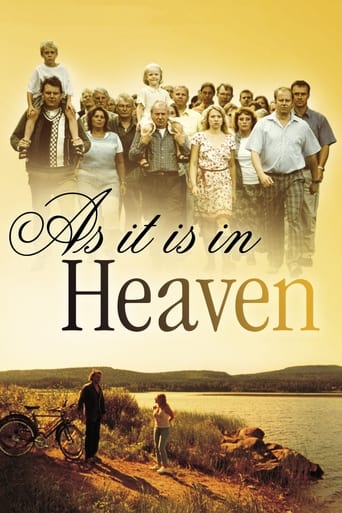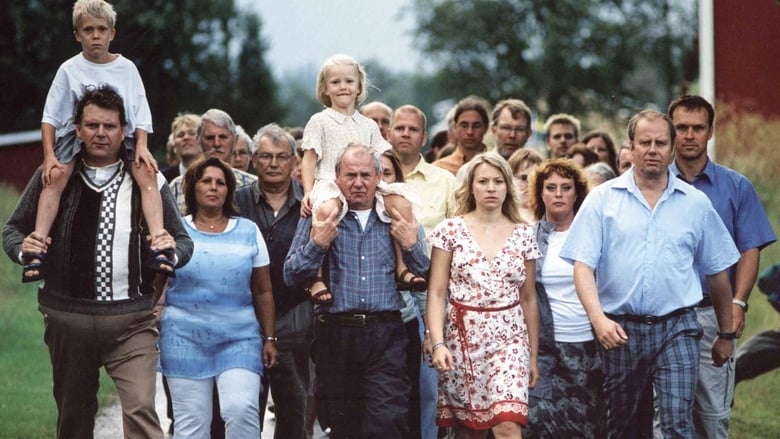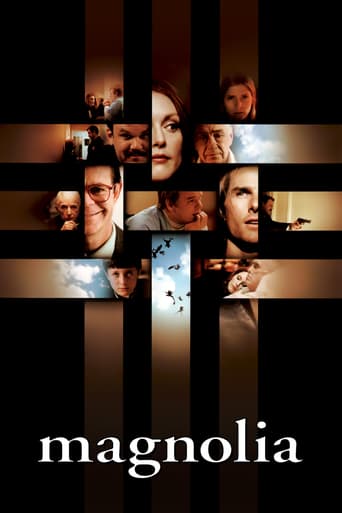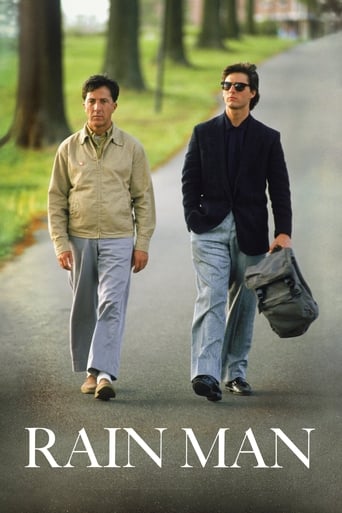

As It Is in Heaven (2004)
A musical romantic tragedy about a famous composer who moves back to his small hometown after having had heart troubles. His search for a simple everyday life leads him into teaching the local church choir which is not easily accepted by the town yet the choir builds a great love for their teacher.
Watch Trailer
Cast


Similar titles
Reviews
Fantastic!
It was OK. I don't see why everyone loves it so much. It wasn't very smart or deep or well-directed.
The first must-see film of the year.
A movie that not only functions as a solid scarefest but a razor-sharp satire.
The Swedish film, As it is in Heaven, directed by Kay Pollak is beautifully written and extremely touching. The main character of the film is Daniel Daréus, a troubled yet very talented composer. Daniel is introduced in the film as being highly successful in his adult life with flashbacks of his traumatic childhood. He decides to move back to his hometown after his heart attack to a small town in Sweden. The towns people do not know that this was his hometown because his agent changed his name when he was 15 years old. The audience is quickly introduced to Lana, a character that is hard not to love. Her positive attitude is quickly transferred to Daniel who up until meeting her seemed very dark and troubled. After he meets Lana, Daniel gets a job as a cantor at the church. Many different characters are introduced that all hold significance in the storyline. Once Daniel enters the church it is safe to say that everything changes and many peoples lives improve, except for a few jealous men that end up being trying to steal everyone's joy. This film has a little bit of everything; it incorporates religion, death, abuse, bullying, love, and disabilities all while keeping a very realistic and relatable storyline. Pollak is able to evoke a feeling of tension in the film through his close-up camera angles while also incorporating the themes of outsiders and guardian angels. The first few minutes of the film the audience is introduced to Daniel in a field, as he is getting bullied by his classmates and repetitively beaten. The camera does close-up shots of the boy's stomach and his face as he is lying on the ground in pain. This scene also includes close-ups of adult Daniel as he is composing a song at one of his famous venues. During the close-up shots of adult Daniel you see his sweat dripping off his hair and body, as well as the blood that is pouring out of his nose. This is clearly offsetting and along with his rapid arm movements they all combine to create an uncomfortable tension to start off the film. This is a common cinematic technique that is often used in Nordic film to help exemplify the characters emotions. Other examples throughout the film include when Lana and Daniel are intimate together and the camera is only focused on their faces as if we are right on top of them as they kiss. Also when Gabriella, the abused choir member decides she will sing the solo song Daniel wrote for her you could see it in her tired eyes how hopeful she was for the future. I believe that Pollak included these close-ups to enhance our understanding of each of the characters. The scenes could have lost much of their meaning if the camera was at a different angle. Another common Nordic theme in films that Pollak also included in this film was the incorporation of outsiders. The obvious outsider in this film would be Daniel as he is world famous and Interrupt the little town and must deal with those who do not want him there. For example the pastor who gets very jealous of Daniel and begins to feel like he is taking attention away from the church. Near the end the audience is exposed to a breakdown that the pastor has towards Daniel when he states, "I used to mean something here" regarding his church and his mourning of his failed marriage. Another outsider in this film is Thore, a mentally disabled boy who loves being around happy crowds. In the beginning he is on the outside just listening to the choir and then decides he wants to be a part of it. The great part about this choir was the acceptance of outsiders and the understanding that everyone has their flaws. Lastly a theme that I often noticed throughout the film, As it is in Heaven, was the idea of guardian angels. Although this concept was not brought up until about half way through the film, as I reflect I believe that angels hold a lot of meaning to the film. Lana claims that she see's angels on people's shoulders and that you just have to look hard to see them. I believe that Lana and the choir were Daniels guardian angels. They transformed him from someone who was unable to love and did not let him be mistreated by the pastor or Connie. On the other hand you could say that Daniel was the guardian angel that many of the characters needed. Such as the pastors wife, when she needed refuge from her crippling marriage she sought out Daniel. Daniel was also there to try to help Gabriella gain a voice in her abusive marriage in which he helped the only way he knew how, to write a solo song for her to sing at a concert. I believe that it sounded like angels singing through the vent as the last scene was shot and Daniel was most likely going to die. He claimed that he had a dream to create music that opens people's hearts, and he certainly accomplished that while also opening his own heart.Overall this was my favorite Nordic film I have watched thus far. I thought that the acting was excellent and I could relate to many of the characters. Through the themes of the outsider and angels while also using close-ups I thought that this film was very special and I would recommend it to anyone looking to watch a great film.
As it is in Heaven is like a melancholy Little Miss Sunshine for Swedes. Quirky and heartwarming, this film follows a small town with a big heart, as its residents find their individual voices and learn to live together in harmony. The story unfolds when world-renowned conductor, Daniel Dareús—who is exhausted by his high-stress career—returns to his childhood village and discovers how a small-town community can heal an aching heart. Daniel becomes the church choir director and his passion for music soon inspires the townspeople to confront the intense emotions they have repressed for years. And as these singers embrace their unique tones, Daniel too has to find how he fits into the chorus. Addressing issues of physical and emotional abuse, sexual subjugation, and the human tendency towards passivity, director Kay Pollak investigates in this internationally acclaimed film what it really means to be a community. It is clear from the get-go that Daniel is exceptional. The opening scene is of him as a young boy, playing the violin in a golden field. As his bow strikes the strings, however, we see that his musical talent earns him nothing more than some nasty bruises and a reputation as a wimp. Daniel leaves his hometown and its bullies, and eventually establishes himself in the world of music as a hugely successful conductor. But when he suffers a severe heart attack that puts an abrupt end to his remarkable career, Daniel decides to return to very place that had nearly squelched his dreams as a boy. Played by the superb Michael Nygvist, Daniel is a captivating mixture of bewildered, awkward, mysterious and compassionate. When he meets the vivacious, outspoken young woman named Lena (Frida Hallgren), who seems his exact opposite, his lingering stare and clumsy smile captivate her attention as well. While Daniel navigates his new position as Vespor, Lena helps him to connect with the people, reminding him when he is frustrated by interruptions during rehearsal that "coffee is important too." While Daniel becomes more and more engaged with the choir, the minister, Stig (Niklas Falk), feels increasingly ostracized by his congregation. Through Stig's character, Pollak brings up questions about the command of organized religion over people's lives. For example, despite his wife's assurance that sexual desire is natural, Stig condemns it as a sinful act. His wife, Inger (Ingela Olsso), therefore, has had to suffer a life of sexual subjugation. As the choir evolves, Inger finds a sense of freedom and happiness form it that she have in her marriage, which leads Stig to criticize Daniel for using unconventional methods. Realizing that her husband is using religion to oppress her and the rest of the choir, Inger shouts, "there is no sin!" She denounces him, and thus the Christian Church, for trapping Christians in a perpetual state of guilt by "handing out sin with one hand and offering redemption with the other."Gabriella (Helen Sjöholm), like Inger, finds her voice through the enlivened choir. Married to an abusive husband, Gabriella has endured years of feeling afraid and helpless. Daniel writes a song entitled "Gabriella's Song" to sing at the concert: a dangerous act, seeing as her husband disapproves of her doing anything independent. When the moment arrives, her performance is stunning; she appears empowered and full of life for the first time in the film. The song itself tells Gabriella's story, as the solo line embraces her courageous spirit, and the chorus part, like the members of the choir, supports her in her journey. Transformed, Gabriella finally leaves her husband and the townspeople cease to be passive bystanders to her husband's crimes. As they open up to one another, the choir becomes its own congregation and the music their way of worship. However, though Daniel appears to be the minister of their spiritual community, he himself has yet to find his own voice. Lena challenges him to release his inhibitions and be vulnerable—something that his position as a world celebrity never allowed him to do. His timidity juxtaposed with Lena's boldness makes for a charming romance: yet another way in which one can learn to trust their voice and, ultimately, strengthen the voice of the community. Because As it is in Heaven is, after all, a love story: a story of how loving others makes someplace home.
(On Mon, 2/16/09, Kay Pollak wrote: Date: Monday, February 16, 2009, 4:55 AM Hej Stephan! Thank you for your exiting view of the movie. I recognize many thoughts, we who have made the film, had during the shooting. Kay Pollak. If everybody has found it's own sound: than, only then:... In spite of being the most beloved Swedish film (seen by 1 158 415 visitors for 88 500 317 SEK) this movie failed to receive a single Swedish Golden Beetle, the most prestigious Swedish film award and nominated for an Oscar. Genuine Swedish, a movie by and for the Swedes: their film. Writer and lecturer for 'new age' management psychology and again-director Kay Pollak reaches with this movie the Swedish Everyman's heart, belonging to the social democratic proletarian culture – yesterdays Artur Artur Lundkvist, Harry Martinsson, Vilhelm Moberg, Eyvind Johnson, Gösta Gustav Jansson, Nils Bohman and today Marianne Fredriksson, Linda Olsson. The social democratic idea allows individual development when the group has "found it's sound". Daniels mother, aware of this, crosses the border, promising a school outside the Swedish establishment. The Swedish model was designed for the Swedish working class. This class-travel of social rise aimed education, a better salary, triggering transitional conflicts. For a time "The Marginal Man"/woman (1937, E. Stonequist). The kaypollakquestion: is in todays globalization yesterdays social democratic idea still sound and safe? The kaypollakanswer can be found in the movies beginning and ending. The between: love, jealousy, domestic violence, intolerance are common events. Vi hear the summer wind, moving the cornfield and the violin playing boy Daniel, interrupted by sequences of the conductor Daniels breakdown, beaten by the village boy Conny and his friends. The widowed mothers promise violates the Swedish social democratic basics. The end of the movie: Daniels death or dream? Finding in the cornfield the boy Daniel, lifting him up in his arms - while the choir, initiated by the disabled Tony starts without the conductor and eventual joined by the audience. In his absence he is among them. One of them. The steadily growing choir is prepared by Daniel Dareus for this moment. The Swedish choir, joined by the Austrian audience, demonstrates the poor Swedes 'richness' (CJL Almqvist, Svenska fattigdomens betydelse, 1838). Guided by disabled disability. Thus can yesterdays social democratic idea, transformed, in spite of Swedish capitalistic backyard-egoism, participate in globalization. When each has found it's own sound: then, only then: As it is in heaven ...or as Helene Sjöholms Gabriela sings: "I want to feel that I have lived my life."
This review only contains spoilers in the sense of offering an interpretation of the film. You must work hard to make my summary fit the plot of the film. The charismatic stranger who comes to a tiny, isolated town in Northern Sweden where he had been bullied as a child is a burnt out orchestral conductor. In this nameless town, the Church is so corrupt and out of touch as to be utterly lawless. Daniel succeeds in getting the small church choir there to sing the music of heaven, but at the same time destroys all the useful hierarchies. More importantly perhaps, he falls in love. The title, which comes from the Lord's Prayer, is only the first indication that the film is held together with strong Christian symbolism. Like Christ, Daniel is surrounded by good and bad women and betrayed by one of his disciples. Like Christ, he dies once to meet his maker and rise again as his believers convert all who listen to them.Despite its religo-didactic character, As it is in Heaven is a well made film with psychologically believable characters, sensitive acting and photography, and an apt representation of what it is like to learn how to make and perform vocal music. The marital close-ups will remind you of Portraits of a Marriage.














